By Laura Baerwolf, Director of Operations, Mona Foundation
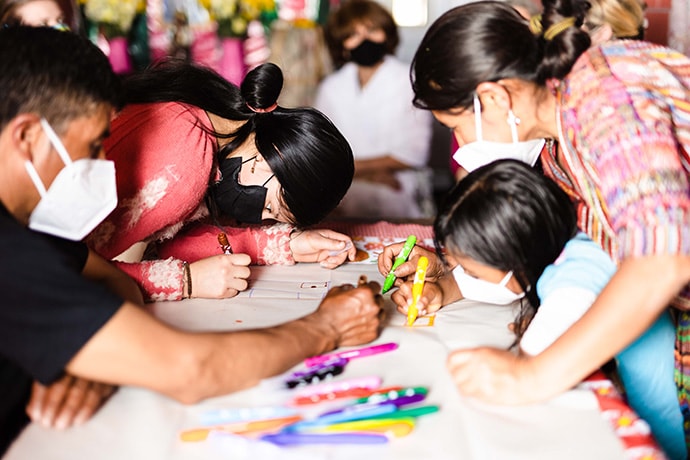
Family engagement activity led by MAIA mentor during home visit. Photo: Mona Foundation.
For the past 23 years, Mona Foundation has worked to alleviate global poverty through education, gender equality, and community transformation. We currently partner with 26 grassroots initiatives in 15 countries to educate and empower over 800,000 students in need, particularly women and girls. While it is widely accepted that investing $1 in education adds $10 in economic growth, in Mona’s experience, educating a girl multiplies this impact by 100. Educated women tend to marry at a later age, have fewer and healthier children, earn higher incomes, spend 90% on their families, and directly impact the development of their communities. All these factors help lift households out of poverty, benefit generations, and transform communities.
But to achieve a gender-just society, education needs to be transformed to teach the lessons of equality, ethics, and service alongside language, math, and science. Mona’s grassroots partners are leading this transformation. Across cultures and countries, their growing experience involves expanding the scope of their educational programs in surprisingly similar ways:
- A school environment that is safe and nurturing in which girls are encouraged to explore their talents and aspirations.
- Employing women teachers, mentors, and staff that serve as role models and daily reminders that becoming an educated, empowered woman is possible.
- Integrating girls’ empowerment programs into the school curriculum.
- Employing the arts to explore concepts of equality, its implications, and practical applications – engaging the heart as well as the mind.
- Assisting boys to reframe their role as champions of equality and justice.
- Engaging fathers and mothers to grow and develop alongside their daughters.
Empowerment programs are essential to helping girls see themselves as equal, autonomous persons worthy of respect, to discover their voice and aspirations, to gain confidence and actively participate in society. But to shift ingrained cultural patterns of inequality, their families must also be supported to recognize the importance of girls’ education and begin to integrate the principle of equality in their daily interactions. Girls don’t have to choose between their families and a life of their choosing. They can have both.
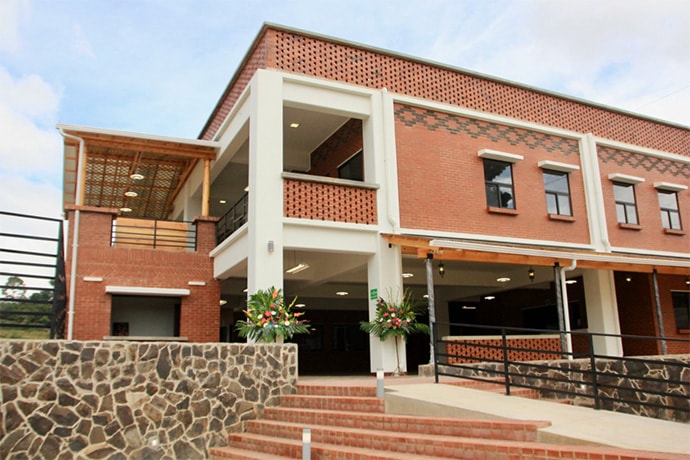
MAIA Impact School. Photo: Mona Foundation.
What Does Transformational Education Look Like?
Mona’s newest partner organization, MAIA Impact School in Guatemala provides an instructive case study. Earlier this month, a team from Mona Foundation visited this impressive program, the first female, Indigenous-led secondary school in Central America serving the most marginalized segment of their society: indigenous Maya girls. For context, Guatemala has the worst gender-equity gap in the Western hemisphere. The prevalent culture gives no value to educating girls, seeing them as subservient to men and useful only for having babies and keeping house. Less than 20% of Maya women complete high school and 57% are married or have become mothers before age 18. In Sololá, where the Impact School is located, the population is 98% Maya and has the second-highest level of poverty in Guatemala with over 75% living on less than $2/day.
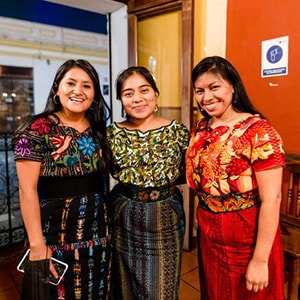
Graduates of the MAIA legacy program. Photo: Mona Foundation.
MAIA is an organization of the people, by the people, and for the people that has built capacity to assess and address local needs over the years. Founded in 2008, the program began as a six-year scholarship and weekend mentorship program aimed at supporting rural Maya girls to become the first in their families to complete public secondary school. While the girls in the program made great strides, with over 240 graduates, the lack of quality education in the public schools impeded their trajectory. MAIA opened the Impact School in 2017 to address this need, providing full scholarships to 300 Indigenous Maya girls from 40 rural highland villages, and impacting some 2,000 family members. The construction of the school itself was funded by an anonymous donor who was so moved by the program that he also established a fund to ensure its ongoing operation and maintenance. The impressive leadership team and staff are 84 percent Maya, 84 percent female, 78 percent under the age of 35, and 38 percent are graduates of the legacy program. The students, who enter the school in Grade 7, are called “Girl Pioneers” because they are blazing a new trajectory towards prosperity and equal opportunity, despite being born into situations of quadruple discrimination as rural, poor, female, and Indigenous.
A Holistic Educational Model
The Impact School is redefining the word “school” through a holistic educational model that gives equal emphasis to academics, culture and identity, socioemotional development, and family engagement.
Academics – Each grade is composed of two classrooms of 25 students each. School days run from 8am to 4pm, three times longer than public school. Rigorous academic instruction, including STEM classes, ensures students gain an average of two academic years of growth every school year with progress assessed along seven competencies. After graduating at Grade 11, a Gap Year Launch Program helps Girl Pioneers write a resume, arrange an internship, and/or apply to university. To support high quality teaching, the school invests over 100 hours of professional development for every MAIA educator and mentor.
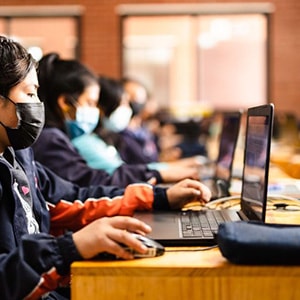
Girl Pioneers in computer class. Photo: Mona Foundation.
Culture and identity – As noted above, nearly all MAIA’s leadership and staff are indigenous Maya women. This mirroring of student race and gender ensures cultural relevance in all school programs. The staff are keenly aware they are role models for the Girl Pioneers. During our visit they would often say, “If she can see it, she can be it.”
Socioemotional development – While teachers focus on academic instruction, a parallel team of mentors support the Girl Pioneers to navigate life’s challenges, develop and use their voices, and actively participate in society. In weekly mentorship classes and 1:1 counseling, the girls learn crucial nonacademic content such as leadership development, reproductive health, vocal empowerment, community engagement and financial literacy.
Attention to socioemotional development runs throughout the school day. For example, a simple but profound activity called a “Community Reunion” is used whenever a group comes together. In a circle, each person shares how they are feeling and their response to a posed “powerful question” (ex. If you could have any superpower, what would it be? Or what does your voice mean to you?). During our visit, this empowering activity was repeated in our meetings with students, staff, and families – giving each person a voice, strengthening bonds of friendship, and celebrating our similarities and diversity. The sense of connectedness after each activity was palpable.
Family engagement – Mentors also visit each student’s family every month with activities that encourage meaningful conversation among family members and foster a new shared vision of their future.
“We learned early on that meaningfully engaging families to grow and develop alongside their daughters is vital for their collective success. Our work with families mirrors the school curriculum so that girls and their families are consistently discussing topics such as personal and family goal-setting; emotional, mental, and physical health; vocal empowerment and healthy communication; and community development. …By ensuring families are learning alongside their daughters, we provide Girl Pioneers with a network of support that is critical to their ability to overcome challenges; together they build a common vision for their future.” – MAIA Impact School
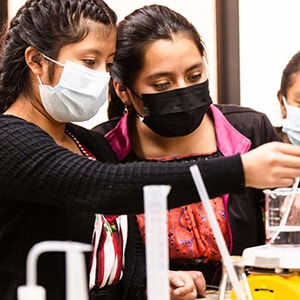
Girl Pioneers at MAIA Impact School. Photo: Mona Foundation.
Joining one of the mentors in visiting a Girl Pioneer’s family was one of the memorable experiences of our visit. We were welcomed by the student and her family – mother, father, grandmother, and four younger siblings — into a small house with dirt floors, clay brick walls, few furnishings, and a tin roof. With all family members present, the mentor led us in a socioemotional activity to foster connectedness and a safe environment. She then facilitated a family activity to promote teamwork and engage in conversation about how the family members could support one another at home. The mentor and family had clearly developed a relationship of deep trust. Afterwards, one of our team members shared:
“The mother spoke of hardships, the baby’s illnesses this past year, jobs lost during Covid for both her and her husband. She spoke of plans to postpone improvements to their home. But at the end of it, hope still shone brightly in her eyes and with a smile she spoke of her family’s commitment to the education of all their children. …The father reiterated the same sentiment.”
The parents’ sacrifice and commitment to educating their daughters was humbling and inspiring.
Environment – All of the above are carried out in a school environment that is welcoming, safe, supportive, empowering, joyful, unifying, and serious. The school itself is beautiful. The building, set within gardens and green space, is simple, elegant, and well suited to its surroundings and purpose. Inspiration is always in view. Along the main walkway, a chain link fence is decorated with the names of empowered women – Rosa Parks, Anne Frank, Sara Curuchich, and so on – that each class had taken as their own. Beneath each name are padlocks the girls had painted with their own names and placed on the fence in a ceremony with their parents as a sign of their commitment to completing their education. A mural painted by students along one wall reads (in Spanish): “Empowered woman… Infinite Impact”.
Outcomes
While the Impact School will celebrate its first high school graduating class this year, MAIA’s legacy mentorship program has already yielded impressive results along four organizational goals:
- ECONOMIC AUTONOMY: Graduates will be independent and upwardly mobile when they earn the average income in Guatemala of $5,000 per year [this figure is being reassessed]. 50% of Girl Pioneer graduates from MAIA’s legacy program (who average 21 years of age) have already escaped poverty.
- LIFELONG LEARNING: Graduates will complete an average of 15 years of schooling. Girl Pioneer graduates from the legacy program are 60 times more likely to enroll in university compared to their non-MAIA counterparts.
- HER FAMILY ON HER TERMS: Graduates will delay marriage and pregnancy until they are at least 25 years old and in a stable position to support a family. 92% of Girl Pioneer graduates from the legacy program are delaying motherhood to complete their studies and further their professional development.
- UNLOCKING LEADERSHIP POTENTIAL: Girl Pioneers are empowered to empower. 58% of Girl Pioneer graduates from the legacy program hold a formal leadership position within an organization.

Mona team with MAIA Board president, School Director, and Director of Operations. Photo: Mona Foundation.
With the Impact School now integrating quality education, girls’ empowerment, and family engagement into a coherent, transformative program, the trajectory for Girl Pioneers is swiftly rising. Mona Foundation looks forward to a long partnership with MAIA and has no doubt the girls it graduates, together with their families and communities, will do much to create a more just, equitable, and prosperous society.
To learn about other Mona Foundation partners working at the forefront of education, gender equality, and community transformation, go to monafoundation.org.